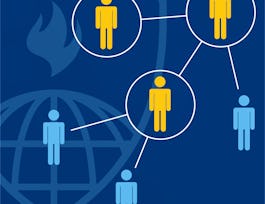This course describes the basic nature if viruses and basic concepts of how they replicate. It looks at traditional methods for propagating and assaying viruses as well as methods to identify and follow them in individuals and populations. It will also look at how we can use molecular genetics to learn how viruses work in molecular detail.



What Are Viruses And How Do We Work With Them?
Dieser Kurs ist Teil von Spezialisierung Foundations in Virology and Vaccinology

Dozent: Mike Skinner
Bei  enthalten
enthalten
Empfohlene Erfahrung
Was Sie lernen werden
Recognise how viruses cause infection
Recognise how vaccines prevent infections
Kompetenzen, die Sie erwerben
- Kategorie: Describe how we can detect, identify and track viruses in individuals and populations
- Kategorie: Identify the features of different vaccine platforms
- Kategorie: Recognise how transmission drives virus pathogenesis and shapes virus evolution
- Kategorie: Understand how the immune response mediates vaccine protection
Wichtige Details

Zu Ihrem LinkedIn-Profil hinzufügen
11 Aufgaben
Erfahren Sie, wie Mitarbeiter führender Unternehmen gefragte Kompetenzen erwerben.

Erweitern Sie Ihre Fachkenntnisse
- Lernen Sie neue Konzepte von Branchenexperten
- Gewinnen Sie ein Grundverständnis bestimmter Themen oder Tools
- Erwerben Sie berufsrelevante Kompetenzen durch praktische Projekte
- Erwerben Sie ein Berufszertifikat zur Vorlage


Erwerben Sie ein Karrierezertifikat.
Fügen Sie diese Qualifikation zur Ihrem LinkedIn-Profil oder Ihrem Lebenslauf hinzu.
Teilen Sie es in den sozialen Medien und in Ihrer Leistungsbeurteilung.

In diesem Kurs gibt es 5 Module
The names of some viruses are instantly recognisable. The impact on an individual, a family, a community, and beyond, can be devastating. Disease, serious illness, and even death. Others have not been in the spotlight so much in recent years but have been incredible threats to humans and humanity. However, most recent COVID-19 pandemic, has shone a spotlight again on viruses and the fragility of our defences against, existing threats that are constantly mutating, adapting and evolving let alone against newly emerging threats. This week we look at the question: What are viruses?
Das ist alles enthalten
6 Videos5 Lektüren2 Aufgaben
How do viruses replicate and spread? If we want to understand the fundamental characteristics of viruses, so that we can find ways to tackle them, we need to know how viruses replicate and spread. In this module, we are going to look at virus replication and spread and introduce some terms around these concepts.
Das ist alles enthalten
9 Videos4 Lektüren2 Aufgaben
To be able to study viruses, we need to be able to isolate and then produce viruses using a process from horticulture called propagation. We can then use cells cultivated in mass quantities using laboratory techniques and pass the isolated virus cells through the cultivated cells to study the effects of the virus in a process called passaging. In this module, we will look at the development of propagation and passaging techniques – how these have evolved over time, and how they have impacted the development and production of vaccines.
Das ist alles enthalten
8 Videos5 Lektüren3 Aufgaben
There was a lot in the media about variants and mutations during the COVID-19 pandemic. We had variants named after where they were first recognised. Then they were given Greek letter identifiers, such as delta and omicron. How important is it to have an understanding of how viruses evolve, and which types of viruses are likely to evolve much quicker than others? What is the impact of mutations on antiviral drug effectiveness? And overall, how are viruses, and the diseases they cause, shaped by mutation, selection and evolution? This week, we will look at virus mutation, their types and consequences, and the evolution of novel viruses through reassortment, recombination, and adaptation.
Das ist alles enthalten
5 Videos2 Lektüren2 Aufgaben1 Diskussionsthema
Conventional virus genetics talks about the range of genotypes, range of phenotypes, stability and quasispecies. Traditional genetic analysis often involves associating observable phenotypes with genotypes, then mapping the mutations causing those genotypes. Mapping normally involves looking at the genetic linkage between known and unknown genetic markers. In this module, we will look at viral genetics - the approaches used in conventional virus genetics, and the limitations of conventional virus genetics.
Das ist alles enthalten
6 Videos3 Lektüren2 Aufgaben1 Diskussionsthema
Dozent

Empfohlen, wenn Sie sich für Basic Science interessieren

The University of Hong Kong

University of Pennsylvania

Johns Hopkins University

Imperial College London
Warum entscheiden sich Menschen für Coursera für ihre Karriere?





Neue Karrieremöglichkeiten mit Coursera Plus
Unbegrenzter Zugang zu 10,000+ Weltklasse-Kursen, praktischen Projekten und berufsqualifizierenden Zertifikatsprogrammen - alles in Ihrem Abonnement enthalten
Bringen Sie Ihre Karriere mit einem Online-Abschluss voran.
Erwerben Sie einen Abschluss von erstklassigen Universitäten – 100 % online
Schließen Sie sich mehr als 3.400 Unternehmen in aller Welt an, die sich für Coursera for Business entschieden haben.
Schulen Sie Ihre Mitarbeiter*innen, um sich in der digitalen Wirtschaft zu behaupten.
Häufig gestellte Fragen
Access to lectures and assignments depends on your type of enrollment. If you take a course in audit mode, you will be able to see most course materials for free. To access graded assignments and to earn a Certificate, you will need to purchase the Certificate experience, during or after your audit. If you don't see the audit option:
The course may not offer an audit option. You can try a Free Trial instead, or apply for Financial Aid.
The course may offer 'Full Course, No Certificate' instead. This option lets you see all course materials, submit required assessments, and get a final grade. This also means that you will not be able to purchase a Certificate experience.
When you enroll in the course, you get access to all of the courses in the Specialization, and you earn a certificate when you complete the work. Your electronic Certificate will be added to your Accomplishments page - from there, you can print your Certificate or add it to your LinkedIn profile. If you only want to read and view the course content, you can audit the course for free.
If you subscribed, you get a 7-day free trial during which you can cancel at no penalty. After that, we don’t give refunds, but you can cancel your subscription at any time. See our full refund policy.

